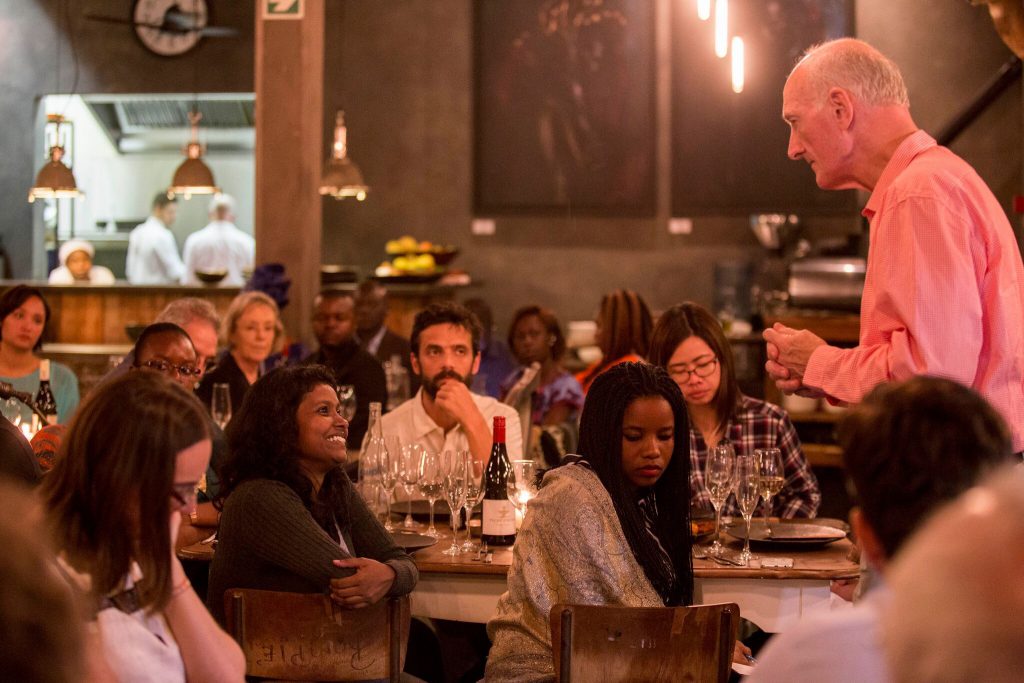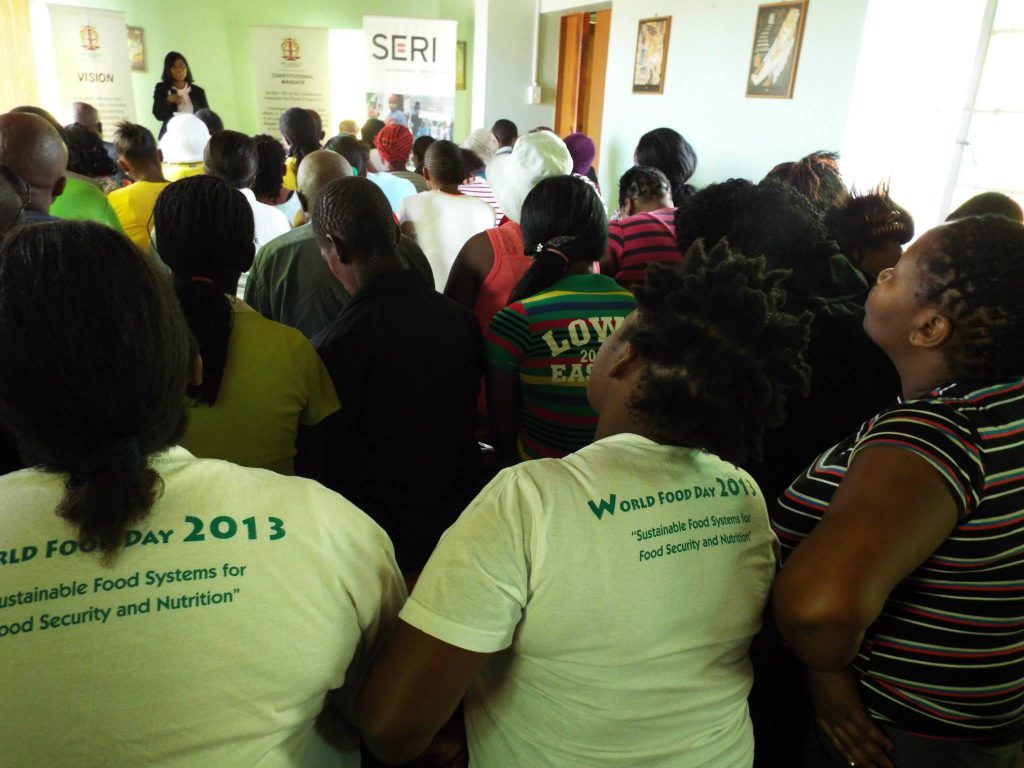Lindokuhle Mdabe is a Bertha Justice “Be Just” Initiative Alumni at Socio-Economic Rights Institute of South Africa, SERI. During his tenure at SERI, he worked mostly on housing and evictions cases, informal trading cases, foreclosure cases, unlawful arrests, criminal cases and the Marikana Commission. He is currently working with informal settlement communities around Johannesburg in order to assist them with their broad strategies: mobilisation, organising, community government engagement, civic and legal education, profiling and documentation for litigation purposes.
This is his personal account.
“The theme of law and poverty has particular resonance to me, and to those of us who have battled poverty in various ways and at a number of terrains.” – Former Chief Justice Puis Langa
“What make some people want to do “good” with the professional and human tools they are given […] rather than use them exclusively for self-interest […] or preservation of the status quo”? This question was once posed by Carrie Menkel-Meadow. It planted a seed in my life as a young lawyer-in-training, a Be Just Fellow, with the Socio-Economic Rights Institute of South Africa, SERI.
Many accept that poverty is engrained in power and that deploying the law to fight poverty exposes the politics of poverty-lawyering. This politics denotes the practice of law with the interest of the poor at heart. It is aimed at using the law as an instrument to achieve social justice. However, it does not imply that the law is the only tool to do so. I know because I saw this first-hand: as a trainee lawyer I operated at an intersection between law and poverty. And so, this is my personal account—a reflection that captures the driving-force behind my commitment to this form of law. My aim is to come to terms with an affirmation of a deeper inner-self in order to explain my lawyering in poverty-stricken areas—a road not often taken.
It is very difficult to understand any lawyer’s source of commitment to a certain form of law. However, the conversations I had with senior lawyers during the Bertha Justice Initiative Convening 2016, sparked this affirmation of lawyering for the “good,” that is, the role of law in achieving social justice. Of all of the anecdotes coming out of this passed convening, Justice Edwin Cameron summed it up best. Describing the earliest cause-lawyering in apartheid South Africa, he said:
“under Apartheid, the law was used to segregate people—this distinctive role of law was challenged by human rights lawyers. This form of legal activism – the idea that the law could be used against itself – was to say it is abhorrent to use a system aimed at achieving justice for unjust causes”.

Cameron then juxtaposed that epoch to the present-day constitutional democracy and said that the law has to reflect an embodiment of the values of dignity, freedom and equality for all – thus prioritising the human project, and carving a new political course for lawyering.
Yet despite this wave of democratisation, recognition of human rights and promises of economic growth, the first decade post-1994 was marked by increased poverty and deeper inequalities. It is in that context that poverty lawyers, who are committed to a tradition which subordinates power (albeit of the state or non-state actors) to the values of constitutionalism, advocate for claims on behalf of the poor: calling for progressive realisation of housing rights, protective labour rights, access to basic services, respect and promotion of civil and political rights. As a conscious law graduate, I joined these modest lawyers in this grinding legal work on poverty at SERI as a Be Just Fellow supported by the Bertha Foundation. During my time at SERI, I saw a number of ways in which the law could be used to improve the circumstances of the poor.

Firstly, with the public-private partnership on the provision of housing to poor residents in Johannesburg, SERI has had to strategically provide much needed legal and civic support to poor residents in instances where landlords and the City of Johannesburg (CoJ) owned companies have engaged in unfair practices, evictions and water and electricity disconnections. Through developing pro-poor jurisprudence in the rental housing market, SERI ensures the balancing of bargaining powers in landlord-tenants disputes.
Secondly, many communities living in informal settlements and those occupying run-down buildings live without basic sanitation and clean water. In line with state policies, local government introduced cost-recovery and cost-cutting measures. Accordingly, non-paying residents were issued with water and electricity bills to root-out the culture of non-payment. Confronted by fears of poverty and their inability to pay the rising costs, poor communities organised and mobilised against the State’s policies. Amongst the earliest formed post-apartheid movements, were: the Anti-Privatisation Forum (Soweto) and Abahlali Basemjondolo (Durban). In the inner-city of Johannesburg, communities occupying dilapidated buildings formed building committees most of which are affiliated to the Inner-City Resource Centre (ICRC). SERI provides legal assistance and civic training to these community movements.
Thirdly, despite clear policy directives on the state to consult poor communities on issues of development, the state has failed to discharge this obligation. Taking proactive steps, SERI has employed litigation to compel the state to upgrade informal settlement communities in line with the communities’ needs, where the state has been reluctant to do so. This litigation is critical for poor communities who are still suffering as a result of continued apartheid spatial injustices. It has the potential of unlocking the agency of these communities, and includes them into discourses about spatial justice and reshaping the cities.
Fourthly, when the City of Johannesburg introduced “operation clean sweep” calling for summary eviction of informal traders in the inner city, SERI challenged this stance through litigation. This litigation restored the dignity of many informal traders who fend for their families through the inner-city informal market. But more importantly it has called for the economic inclusion and participation of the poor on setting a spatial vision for the future city.
Lastly, SERI has provided criminal defence in cases where dissent by poor communities has been suppressed by the state. For example, where the criminal justice system has been used to halt the exercise of political and civil liberties of poor communities. On the labour front, even though there are stringent labour laws benefiting both employers and employees, such laws have facilitated the keeping of wages at the lowest rate—thus leading to the perception of exploitation of labour. Minority unions have suffered, at times even fatally, given their exclusion from and their lack of protection from the African National Congress-affiliated Congress of South African Trade Unions (COSATU) . The legal support provided to the Association of Mineworker and Construction Union (AMCU) and the Commercial Stevedoring Agricultural & Allied Workers’ Union (CSAAWU) by SERI has gone a long way into restoring the public image of both these minority unions.
All these fronts of poverty lawyering that I was exposed to as a young lawyer at SERI point to how the law may restore the agency of the poor by placing poverty firmly at the core of the human rights agenda. But more importantly, this journey affirmed my own personal identity— and challenged the old adage of separation between law and the personal morality. The take home point is: it is possible to practice law with a deliberate political agenda to achieve social justice for poor communities we identify ourselves with.

Lindokuhle Mdabe, Bertha Justice Initiative “Be Just” Alumni, Socio-Economic Rights Institute of South Africa, SERI
Follow Lindokuhle on Twitter @lindamdabe
Follow SERI on Twitter @SERI_RightsSA
Article Tags: Apartheid / Bertha Fellows / Human Rights / human rights lawyers / movement lawyering / SERI / South Africa